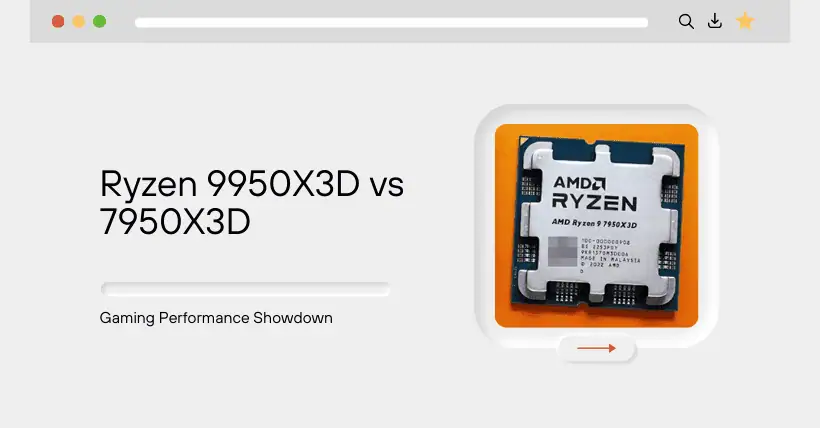1. Preface
When it comes to AMD’s 3D-Vache series processors, many people immediately think of gaming performance. The large cache capacity significantly boosts gaming capabilities, making it a long-time favorite among high-end gamers.
This article compares the gaming performance of the Ryzen 9 9950X3D and the Ryzen 9 7950X3D to evaluate how much improvement the new model offers, providing a reference for those interested.
2. Specifications Comparison
The Ryzen 9 7950X3D was released on January 4, 2023, using TSMC’s 5nm process. It features 16 cores and 32 threads, with 1MB of L1 cache, 16MB of L2 cache, and 128MB of L3 cache. Its base clock is 4.2 GHz, with a maximum boost clock of 5.7 GHz. Power consumption is rated at 120W, and the suggested retail price is $699.
The Ryzen 9 9950X3D was released on January 6, 2025, utilizing TSMC’s 4nm process. It also has 16 cores and 32 threads, with 1MB of L1 cache, 16MB of L2 cache, and 128MB of L3 cache. Its base clock is 4.3 GHz, with a maximum boost clock of 5.7 GHz. The default TDP is 170W, and the official suggested retail price is $699.
3. Test Platform Configuration
Main configuration as follows:
Processors: Ryzen 9 7950X3D and Ryzen 9 9950X3D
Motherboard: MSI MPG X670E CARBON
Memory: 32GB DDR5-6000MHz
Graphics Card: GeForce RTX 5090
Storage: Two Samsung 970 1TB SSDs
Operating System: Windows 11
4. Game Testing (Ryzen 9950X3D vs 7950X3D)
Seven games were tested using 1080P resolution. In the image series below, the left side represents the Ryzen 9 7950X3D platform, and the right side represents the Ryzen 9 9950X3D platform.
You may wonder: why use the GeForce RTX 5090 and test in 1080P instead of 4K? Because 4K resolution primarily stresses the GPU rather than the CPU, which contradicts the purpose of this comparison. 1080P is more suitable for testing CPU performance.
Game 1: Ghostwire: Tokyo
- Ryzen 9 7950X3D: Avg FPS 214, Min FPS 167, Frame Time 4.3ms, CPU usage 13%, Power 77W, Temp 62°C, RAM 12.4GB, GPU usage 79%, VRAM 6.4GB, GPU Power 321W, Temp 51°C
- Ryzen 9 9950X3D: Avg FPS 242, Min FPS 195, Frame Time 4.0ms, CPU usage 11%, Power 94W, Temp 65°C, RAM 11.2GB, GPU usage 89%, VRAM 6.8GB, GPU Power 356W, Temp 53°C
Result: Ryzen 9 9950X3D leads by 28 FPS (13% improvement), 18 FPS higher minimum, frame times nearly equal.
Game 2: Cyberpunk 2077
- Ryzen 9 7950X3D: Avg FPS 155, Min FPS 95, Frame Time 6.6ms, CPU 35%, Power 93W, Temp 71°C, RAM 10.9GB, GPU 83%, VRAM 8.7GB, GPU Power 318W, Temp 48°C
- Ryzen 9 9950X3D: Avg FPS 177, Min FPS 110, Frame Time 5.8ms, CPU 34%, Power 119W, Temp 71°C, RAM 11.5GB, GPU 94%, VRAM 8.9GB, GPU Power 340W, Temp 50°C
Result: 22 FPS gain (14% improvement), 15 FPS higher minimum, slightly better frame time.
Game 3: Red Dead Redemption 2
- Ryzen 9 7950X3D: Avg FPS 214, Min FPS 136, Frame Time 3.8ms, CPU 37%, Power 90W, Temp 66°C, RAM 13.3GB, GPU 81%, VRAM 5.4GB, GPU Power 309W, Temp 50°C
- Ryzen 9 9950X3D: Avg FPS 219, Min FPS 123, Frame Time 3.3ms, CPU 37%, Power 131W, Temp 72°C, RAM 12.1GB, GPU 85%, VRAM 5.3GB, GPU Power 345W, Temp 50°C
Result: 5 FPS gain (small), but lower minimum FPS. Overall nearly identical.
Game 4: Spider-Man 2
- Ryzen 9 7950X3D: Avg FPS 79, Min FPS 66, Frame Time 12.6ms, CPU 43%, Power 98W, Temp 69°C, RAM 16.5GB, GPU 74%, VRAM 12.0GB, GPU Power 221W, Temp 44°C
- Ryzen 9 9950X3D: Avg FPS 80, Min FPS 61, Frame Time 10.5ms, CPU 44%, Power 132W, Temp 71°C, RAM 16.6GB, GPU 92%, VRAM 12.2GB, GPU Power 231W, Temp 43°C
Result: Virtually equal performance. 9950X3D has lower frame time, but lower minimum FPS.
Game 5: STALKER 2
- Ryzen 9 7950X3D: Avg FPS 61, Min FPS 35, Frame Time 15.7ms, CPU 38%, Power 87W, Temp 69°C, RAM 18.4GB, GPU 48%, VRAM 8.0GB, GPU Power 177W, Temp 41°C
- Ryzen 9 9950X3D: Avg FPS 79, Min FPS 44, Frame Time 11.9ms, CPU 33%, Power 128W, Temp 71°C, RAM 18.0GB, GPU 65%, VRAM 8.0GB, GPU Power 197W, Temp 42°C
Result: 18 FPS gain (30% improvement), 9 FPS higher minimum, frame time significantly lower.
Game 6: PUBG
- Ryzen 9 7950X3D: Avg FPS 305, Min FPS 170, Frame Time 3.4ms, CPU 24%, Power 78W, Temp 76°C, RAM 14.5GB, GPU 60%, VRAM 5.4GB, GPU Power 295W, Temp 49°C
- Ryzen 9 9950X3D: Avg FPS 373, Min FPS 191, Frame Time 2.6ms, CPU 19%, Power 105W, Temp 69°C, RAM 14.6GB, GPU 73%, VRAM 5.6GB, GPU Power 318W, Temp 49°C
Result: 68 FPS gain (22% improvement), 21 FPS higher minimum, frame time improved.
Game 7: Hogwarts Legacy
- Ryzen 9 7950X3D: Avg FPS 50, Min FPS 39, Frame Time 19.1ms, CPU 15%, Power 75W, Temp 66°C, RAM 21.8GB, GPU 37%, VRAM 12.0GB, GPU Power 172W, Temp 39°C
- Ryzen 9 9950X3D: Avg FPS 60, Min FPS 47, Frame Time 16.9ms, CPU 15%, Power 99W, Temp 64°C, RAM 21.6GB, GPU 43%, VRAM 11.8GB, GPU Power 193W, Temp 41°C
Result: 10 FPS gain (20% improvement), 8 FPS higher minimum, 2ms lower frame time.
5. Comparison Conclusion
Overall, compared to the Ryzen 9 7950X3D, the Ryzen 9 9950X3D shows a significant performance improvement. In most cases, even with equal or lower CPU load, the Ryzen 9 9950X3D platform delivers notably better GPU performance.
Excluding the two games that resulted in a tie, based on data from the other five games, the Ryzen 9 9950X3D offers approximately 20% higher overall gaming performance under 1080P settings. This concludes the analysis and is provided for reference only.

Disclaimer: This article is created by the original author. The content of the article represents their personal opinions. Our reposting is only for sharing and discussion purposes and does not imply our endorsement or agreement. If you have any objections, please get in touch with us through the provided channels.



